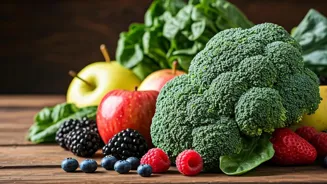Fiber: The Essentials
Fiber, often overlooked, is a dietary component vital for digestive health and overall well-being. It is a type of carbohydrate that the body cannot digest,
making its presence in our diet essential. Fiber is typically categorized into two main types: soluble and insoluble. Soluble fiber dissolves in water and forms a gel-like substance, aiding in lowering cholesterol and regulating blood sugar levels. Insoluble fiber, on the other hand, does not dissolve, adding bulk to the stool and promoting regular bowel movements. A diet rich in both types of fiber is critical for maintaining a healthy digestive system and warding off various health issues. Understanding the different types of fiber and their functions enables individuals to make informed choices about their diet, fostering optimal health benefits.
Myth Busting Begins
Many misconceptions surround fiber, often hindering individuals from reaping its benefits. One common myth is that all fiber sources are equal; however, the type of fiber and its impact varies widely. Another misconception involves the belief that increased fiber intake always leads to immediate digestive ease. While fiber is beneficial, rapid increases can cause bloating or discomfort; hence, a gradual integration is crucial. Some believe that fiber only impacts digestion, failing to recognize its broader role in disease prevention and overall health. Additionally, the belief that processed foods are a good source of fiber is misguided, as these foods often contain minimal fiber and can be laden with unhealthy additives. These prevalent myths can prevent people from adopting healthy dietary patterns. By dispelling these misconceptions, individuals can enhance their understanding of fiber and its impact on their well-being.
Quality and Quantity
Both the amount and the quality of fiber in your diet significantly impact your health. The recommended daily fiber intake is about 25–30 grams. The source of fiber also matters; for instance, fiber from whole grains, fruits, and vegetables offers more significant health benefits than refined sources. Eating a variety of fiber-rich foods ensures a diverse nutrient intake, contributing to a balanced diet. Quantity alone isn't enough; focusing on whole, unprocessed foods provides essential vitamins, minerals, and antioxidants. The quality of fiber affects how your body processes it. High-quality fiber promotes better digestion and overall wellness. The emphasis should be on choosing a range of foods that support a robust diet rather than simply aiming for a specific fiber gram amount. Thus, one can fully realize the health benefits of fiber by considering both quantity and quality.
Fiber for Health
Fiber plays a vital role in maintaining overall health, extending beyond just digestion. Adequate fiber intake helps in reducing the risk of chronic diseases, including heart disease and type 2 diabetes. It aids in controlling blood sugar levels and improving cholesterol levels. Fiber also contributes to a feeling of fullness, assisting in weight management by reducing overeating. Moreover, fiber promotes the growth of beneficial gut bacteria, essential for immunity and overall health. Regular fiber consumption is associated with a lower risk of certain cancers, particularly colon cancer. By supporting gut health, regulating blood sugar, and assisting in weight control, fiber is a key component of a preventive health strategy. Embracing fiber in your diet can improve your body’s ability to function and defend against diseases.
Fiber for Life
Incorporating fiber into your lifestyle involves simple dietary changes. Focus on increasing your intake of whole grains, such as oats, brown rice, and whole-wheat bread. Eat a variety of fruits and vegetables daily, adding them to your meals and snacks. Legumes, including beans, lentils, and chickpeas, are excellent fiber sources and can be included in soups, salads, or as a side dish. Add nuts and seeds to your meals, like almonds, flaxseeds, and chia seeds. When making changes, increase fiber gradually to minimize digestive discomfort. Drink plenty of water to support fiber's function. These simple, practical steps can transform your diet, leading to better digestive health and overall wellness. By integrating fiber-rich foods consistently, you can make a lasting impact on your health.















